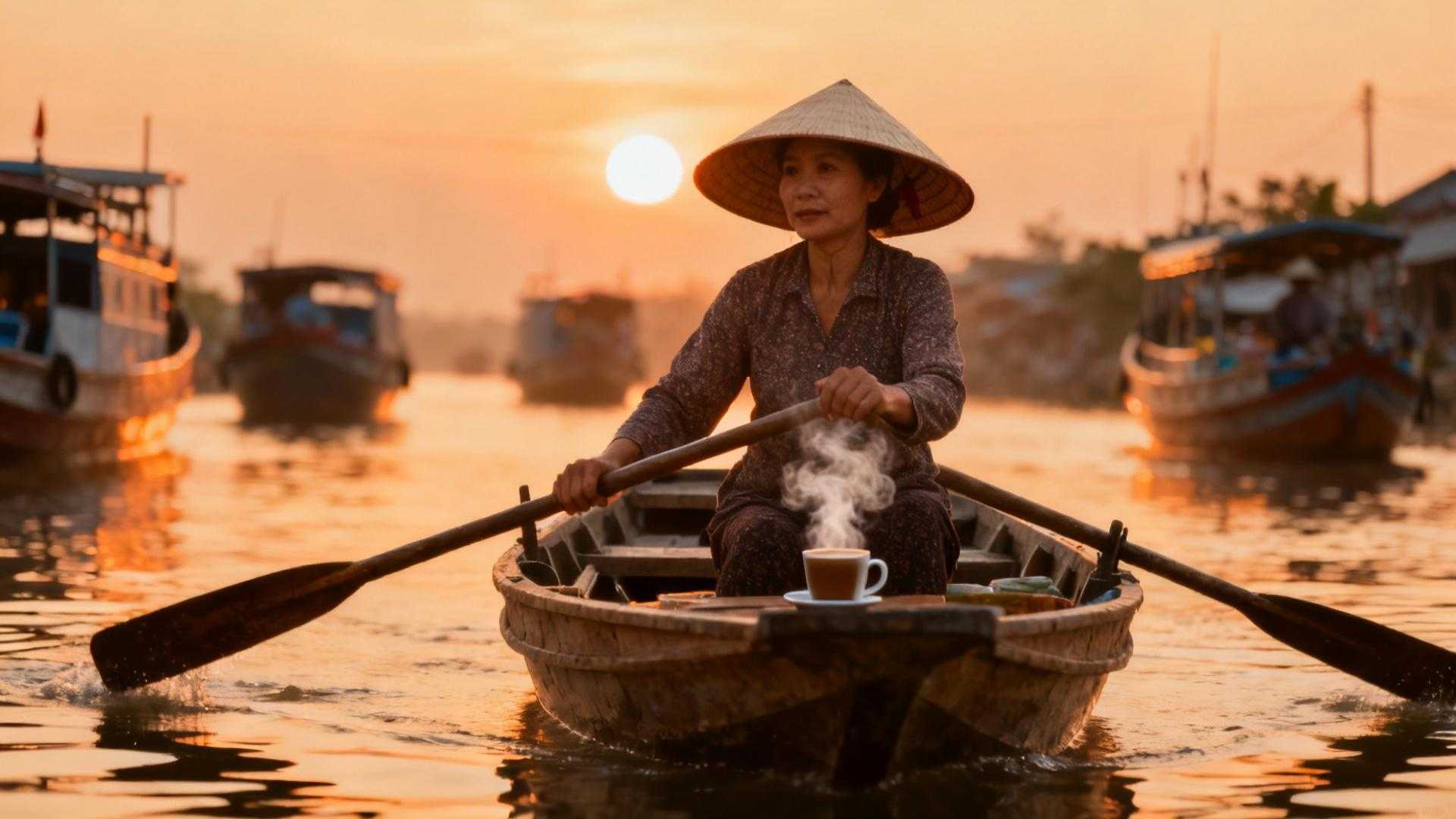The alarm buzzed at 4:30 AM, but I was already wide awake with anticipation. Three months ago, I stumbled upon Can Tho’s floating markets by accident while researching overpriced Bangkok alternatives. That serendipitous discovery completely transformed how I experience Southeast Asia’s river cultures.
What started as a budget-conscious detour from Thailand’s tourist-packed floating markets became the most authentic cultural immersion I’ve experienced in 25 years of travel. The early morning mist rising from the Hau River revealed a world that guidebooks barely mention but locals have preserved for generations.
Now I deliberately skip Bangkok’s $150-per-night hotels and crowded Damnoen Saduak market. Instead, I head straight to Vietnam’s Mekong Delta heartland, where authentic river commerce thrives without the Instagram crowds and inflated prices that have destroyed Thailand’s traditional water markets.
The accidental discovery that changed my Southeast Asian travel
Why I ended up in Can Tho at dawn
My original plan involved the typical Bangkok floating market tour – $80 for a sanitized tourist experience starting at a civilized 8 AM. But visa delays forced me to pivot to Vietnam, and local contacts mentioned Cai Rang Floating Market as an authentic alternative that most travelers overlook completely.
The moment everything shifted
At 5:30 AM, our narrow boat slipped into the pre-dawn darkness of Can Tho River. Within minutes, dozens of merchant boats emerged from the mist like floating villages. Women preparing steaming pho bo on tiny boat kitchens, wholesale fruit traders negotiating over mountains of dragon fruit and rambutan, coffee vendors brewing robust Vietnamese coffee in traditional aluminum filters.
What I found that no Bangkok tour offers
Authentic wholesale commerce without tourist theatrics
Unlike Bangkok’s performer-vendors posing for photos, Can Tho’s merchants conduct real business on the water. I watched genuine negotiations between fruit farmers and distributors, observed families who actually live on their boats, and experienced authentic Vietnamese breakfast prepared fresh on floating kitchens for $3 instead of Bangkok’s $25.
Cultural depth that transforms your perspective
The floating markets represent 300 years of Mekong Delta heritage where water-based commerce isn’t tourism – it’s survival. Local families shared stories of how their grandparents established these trading routes, how seasonal floods dictate market rhythms, and why early morning timing connects to ancient agricultural cycles that Bangkok tours completely ignore.
The transformation I never expected
From tourist to cultural participant
By 7 AM, I was helping sort dragon fruit on a merchant boat while learning basic Vietnamese market phrases. The grandmother running the floating kitchen insisted I try her secret fish sauce recipe passed down four generations. This wasn’t scripted interaction – it was genuine human connection impossible in Thailand’s commercialized floating market circus.
Understanding authentic Southeast Asian river culture
Can Tho revealed how river communities actually function beyond tourist performances. I discovered floating rice paper workshops, traditional boat-building techniques, and seasonal migration patterns that connect the entire Mekong system. This cultural education would cost $300+ in Bangkok private tours, but emerged naturally through respectful participation in daily Mekong life.
Why my Thailand floating market days are over
The cost comparison that sealed my loyalty
Bangkok floating market tours: $80 plus $150+ accommodation plus crowds plus staged experiences. Can Tho floating market tours: $15 including boat transportation, $40 riverside guesthouse, zero crowds, 100% authentic cultural immersion. The mathematics alone justify the pivot, but the cultural authenticity makes it permanent.
The cultural preservation I want to support
Bangkok’s floating markets prioritize tourist entertainment over cultural preservation. Can Tho’s merchants asked me to share their story respectfully – they want travelers who appreciate Mekong Delta heritage without exploiting it. Supporting authentic Vietnamese river culture feels infinitely more meaningful than funding Thailand’s tourist-market industrial complex.
Three months later, I’ve convinced twelve fellow travelers to skip Bangkok’s floating market disappointments. Each one discovered what I did – that authentic Southeast Asian river culture thrives in Vietnam’s Mekong Delta, where dawn still reveals genuine merchant boats, traditional breakfast kitchens, and families who welcome respectful travelers into their floating world.
Book your early morning Can Tho experience before tourism discovers what locals have protected for generations. The 5:30 AM boat departure might challenge your sleep schedule, but discovering authentic Vietnamese river culture will transform your understanding of what Southeast Asian floating markets can actually offer curious travelers.
Essential information for your Can Tho floating market visit
When should I visit Can Tho’s floating markets?
The optimal time is during Vietnam’s dry season from December to April, with temperatures around 75-85°F. Tours depart daily at 5:30 AM when wholesale trading peaks, lasting until 10 AM when merchant boats disperse.
How much does a Can Tho floating market tour cost?
Authentic boat tours cost $15-20 per person including transportation from Can Tho city center. Add $3 for traditional floating breakfast and $40 for quality riverside accommodation, totaling under $65 versus Bangkok’s $200+ equivalent experience.
What makes Can Tho different from Bangkok floating markets?
Can Tho features genuine wholesale commerce with merchant families conducting real business, while Bangkok’s markets primarily serve tourists. Can Tho’s Cai Rang market operates on traditional agricultural rhythms with authentic Vietnamese breakfast prepared on boat kitchens.
Is Can Tho floating market suitable for first-time Vietnam visitors?
Absolutely – Can Tho offers excellent tourist infrastructure with English-speaking guides, comfortable boat transportation, and cultural immersion without language barriers. The experience provides ideal introduction to authentic Vietnamese river culture.
How do I get to Can Tho from major Vietnamese cities?
Can Tho sits 3.5 hours by bus from Ho Chi Minh City or 1 hour by domestic flight to Binh Thuy Airport. Most travelers combine Can Tho with Mekong Delta tours, making it easily accessible for authentic Asian cultural discoveries similar to affordable riverside experiences and undiscovered cultural destinations.
